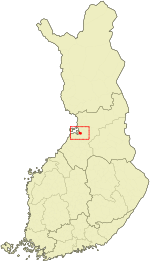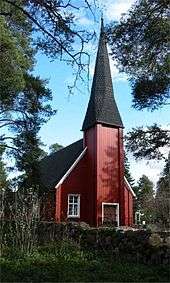Kempele
| Kempele | ||
|---|---|---|
| Municipality | ||
| Kempeleen kunta | ||
|
Holy Trinity Church, Kempele | ||
| ||
 Location of Kempele in Finland | ||
| Coordinates: 64°54′45″N 025°30′30″E / 64.91250°N 25.50833°ECoordinates: 64°54′45″N 025°30′30″E / 64.91250°N 25.50833°E | ||
| Country | Finland | |
| Region | Northern Ostrobothnia | |
| Sub-region | Oulu sub-region | |
| Charter | 1867 | |
| Government | ||
| • Municipality manager | Tuomas Lohi | |
| Area (2011-01-01)[1] | ||
| • Total | 110.35 km2 (42.61 sq mi) | |
| • Land | 110.12 km2 (42.52 sq mi) | |
| • Water | 0.23 km2 (0.09 sq mi) | |
| Area rank | 327th largest in Finland | |
| Population (2016-03-31)[2] | ||
| • Total | 17,041 | |
| • Rank | 73rd largest in Finland | |
| • Density | 154.75/km2 (400.8/sq mi) | |
| Population by native language[3] | ||
| • Finnish | 99% (official) | |
| • Swedish | 0.1% | |
| • Others | 0.8% | |
| Population by age[4] | ||
| • 0 to 14 | 25.8% | |
| • 15 to 64 | 64.8% | |
| • 65 or older | 9.4% | |
| Time zone | EET (UTC+2) | |
| • Summer (DST) | EEST (UTC+3) | |
| Postal code | 90440, 90450 | |
| Municipal tax rate[5] | 19.5% | |
| Website | www.kempele.fi | |
Kempele is a municipality just south of the city of Oulu in Northern Finland. Historically it was in the province of Oulu, but today it is in the region of Northern Ostrobothnia. The population of Kempele is 17,041 (31 March 2016) and the municipality covers an area of 110.33 square kilometres (42.60 sq mi) (excluding sea), of which 0.21 square kilometres (0.081 sq mi) is inland waters (2011-01-01). The population density is 155 inhabitants per square kilometre (400/sq mi) (31 March 2016). The municipality of Kempele was founded in 1867.
Kempele is the birthplace of NHL goaltender Pekka Rinne.
The neighbouring municipalities are Liminka, Oulu, Oulunsalo and Tyrnävä.
History
Kempele was first permanently settled about 500 years ago, at a time when the coastline was closer than it is today. Kempele was considered part of Greater Liminka and consisted of only three houses in 1568, when it was called Kempele for the first time in official records. In 1774 full church privileges were granted to Kempele, which meant separation from Liminka and establishment as an autonomous parish. The municipal government was established in 1867.
Sights

The old church of Kempele, which was built between 1688 and 1691, is one of the oldest wooden churches in Finland. Kempele was granted the right to build a prayer room in 1688, but parishioners decided to construct a church with a steeple. Given the custom of burying local notables under the church, there are about 150 graves in the crypt, the last of them dating from 1796. The church includes decorations by the noted Finnish painter Mikael Toppelius.
The old church ceased to be in active use after a new church was built next to it in the 1990s, but some events are still held in it from time to time.
Kempele may be best known for being the headquarters of the world-famous heart rate monitor corporation Polar Electro, which first brought the device to market in 1978.
International relations
Twin towns — Sister cities
References
- ↑ "Area by municipality as of 1 January 2011" (PDF) (in Finnish and Swedish). Land Survey of Finland. Retrieved 9 March 2011.
- ↑ "Ennakkoväkiluku sukupuolen mukaan alueittain, maaliskuu.2016" (in Finnish). Statistics Finland. Retrieved 31 March 2016.
- ↑ "Population according to language and the number of foreigners and land area km2 by area as of 31 December 2008". Statistics Finland's PX-Web databases. Statistics Finland. Retrieved 29 March 2009.
- ↑ "Population according to age and gender by area as of 31 December 2008". Statistics Finland's PX-Web databases. Statistics Finland. Retrieved 28 April 2009.
- ↑ "List of municipal and parish tax rates in 2011". Tax Administration of Finland. 29 November 2010. Retrieved 13 March 2011.
- ↑ "Välissuhted" (in Estonian). Elva linn. Retrieved 23 July 2011.
External links
-
 Media related to Kempele at Wikimedia Commons
Media related to Kempele at Wikimedia Commons - Municipality of Kempele
- Map of Kempele


